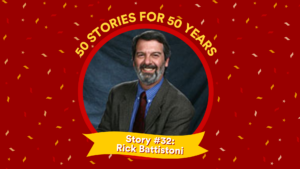 Story #32: Rick Battistoni
Story #32: Rick Battistoni
Today we are featuring the story of a student who was part of JEP’s very first cohort and has since gone on to an impressive career that has always put an emphasis on service-learning and community engagement.
Rick Battistoni (’76) first participated during his Freshman year in 1972 as part of his Spanish class where he worked with a 4th grade ESL student on various school tasks. Even though he continued participating in JEP afterwards, he said that the first year of his involvement was a really pivotal experience for him. Particularly, the act of going off campus and into the community, getting out of his own bubble, and learning more about the community USC was built in was really special to him.
Battistoni mentioned how one specific instance of a student, whose name he still remembers fifty years later, not wanting to salute the flag as part of the school’s morning ritual and the subsequent isolation of that student was impactful to how he thought about diversity and inclusion. Also, just working with his students 1-on-1 and helping them with their school work really helped him understand their individual stories or struggles. He said, “I’m not claiming I did anything that made a difference but it had an impact on me. So much of what I do has changed as a result of that experience.”
Today, Battistoni works as a Professor of Political Science and Public and Community Service Studies and Director of the Feinstein Institute for Public Service at Providence College. He still includes service learning opportunities in his classes. He shared that his years at USC and with JEP heavily shaped his decision to pursue higher education and the field of service in particular. “When I went off to graduate school I knew I wanted to go into higher education and wanted to be a part of the community my institution was a part of. I was so much more comfortable just being part of the community and having conversations. I came to understand that my learning had to be more than book learning but that it had to include people who had stories to tell as a way of understanding the world and the way things work” Battistoni said.
But JEP did not only have an impact on him, but also made a big difference on how the community viewed USC. He remembered, “When I first started going into the schools, an individual approached me and said, ‘you need to learn about what the history of the place you represent is.’ So from the very beginning I was very intrigued to speak to as many people as I could about USC’s history in the community. And I did talk a lot with different people about how USC came about and how USC transformed itself from an institute that was not a partner to the community to making a real effort to build true mutually beneficial, reciprocal relationships through initiatives like JEP.”